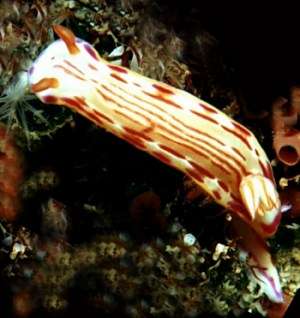
Hypselodoris fucata
Gosliner & Johnson, 1999
Order: NUDIBRANCHIA
Suborder: DORIDINA
Superfamily: EUDORIDOIDEA
Family: Chromodorididae
PHOTO
South Coast KwaZulu-Natal, South Africa. Scottburgh - 24m, 28 November 1999. Size: 50mm. PHOTO: Valda Fraser.
This species has a regular arrangement of red a nd white longitudinal lines. There are three white line down the middle of the mantle from the rhinophores to the gills alternating with four reddish lines. There are also a pair of broken lines of the same colour running around the mantle edge, although the colour of the outer broken line can become almost purple in some parts of the mantle. The edge of the mantle forms a yellow-orange band. The rhinophores are orange-red and the simple gills are white with orange-red edging.
Similar coloured species are H. paulinae, H. kaname Baba, 1994 and H. koumacensis Rudman, 1995.
Reference:
• Gosliner, T.M. & Johnson, R.F. (1999) Phylogeny of Hypselodoris (Nudibranchia: Chromodorididae) with a review of the monophyletic clade of Indo-Pacific species, including descriptions of twelve new species. Zoological Journal of the Linnean Society, 125: 1-114.
Rudman, W.B., 1999 (December 2) Hypselodoris fucata Gosliner & Johnson, 1999. [In] Sea Slug Forum. Australian Museum, Sydney. Available from http://www.seaslugforum.net/find/hypsfuca
Related messages
Hypselodoris fucata from South Africa
May 14, 2010
From: Tjaart de Beer
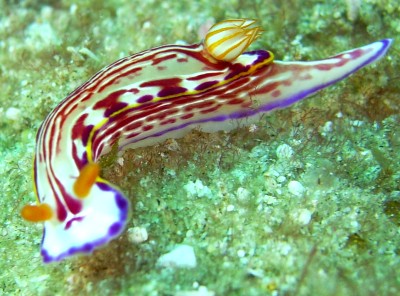
Hi Bill
I am struggling to identify this Hypselodoris. The closest I can get is H. kaname but the location seems wrong. Any ideas?
Locality: 7-mile reef, Sodwana, 14m, South Africa, Indian Ocean, 02 January 2010, Reef top on sand + algae. Length: ~25mm. Photographer: Tjaart de Beer.
Thanks!
Tjaart
tdebeer@gmail.com
de Beer, T.A.P., 2010 (May 14) Hypselodoris fucata from South Africa. [Message in] Sea Slug Forum. Australian Museum, Sydney. Available from http://www.seaslugforum.net/find/23203Dear Tjaart,
I am pretty sure this is Hypselodoris fucata which was described from South Africa. We know very little about this species but your animal is very similar in colour and shape to an animal we have on the Forum from Kenya [message #13773]. The white lines in your animal are not as obvious as in earlier specimens, but I am sure they are there.
There are less than 5 previous records of this species, so your message is very valuable
Best wishes,
Bill Rudman
Hypselodoris fucata from Reunion Island
March 22, 2010
From: Sully Bachel
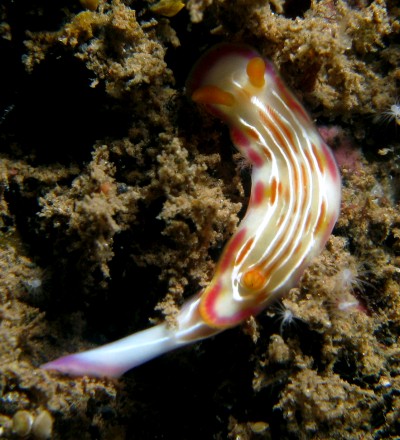
Concerning message #13773:
Dear Bill
I have found this species on a rock covered by anemones. First, I thought it was Hypselodoris maculosa. but on the computer, there are too much differences with H. maculosa which I am used to see on Reunion Island
May be it is juvenile form of H. fucata
Locality: Le Port, 18 m, Reunion, Indian Ocean, 20 March 2010, on a rock. Length: 15-20 mm. Photographer: Sully BACHEL.
What is your opinion?
Sully
s.bachel@orange.fr
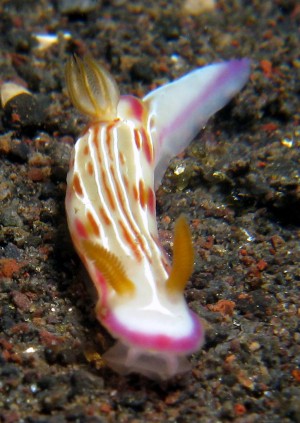
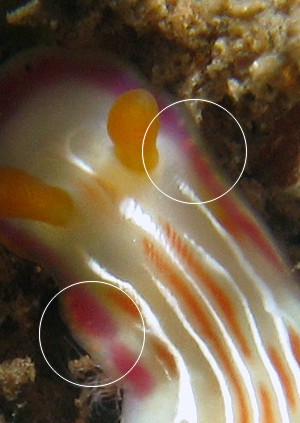
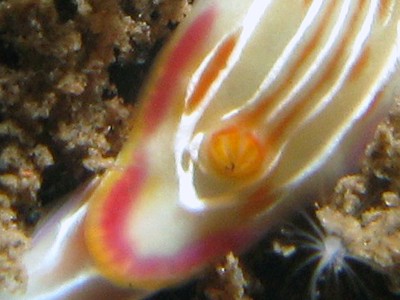
Dear Sully,
We don't know much about this species and its variability but I would agree that it is most probably H. fucata. Chromodorids have glands or sacs in their mantle to store defensive chemicals they extract from their food sponges. In each genus the shape and position of the glands are usually quite characteristic. In species of Hypselodoris the glands are quite small and egg-shaped and most of the glands are concentrated in three places - at the mantle edge, on either side, just behind the rhinophores, and eound the posteror edge of the mantle. I have included close-ups to show these three concentrations.
Best wishes,
Bill Rudman
Hypselodoris fucata from Mombasa, Kenya
May 17, 2005
From: Valérie Besnard
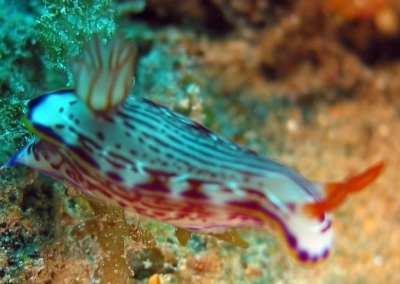
valeriebesnard@aol.com
Besnard, V., 2005 (May 17) Hypselodoris fucata from Mombasa, Kenya. [Message in] Sea Slug Forum. Australian Museum, Sydney. Available from http://www.seaslugforum.net/find/13773Dear Valérie,
I am pretty sure this is Hypselodoris fucata, which is quite interesting, as we know very little about this species apart from its description from Natal, South Africa. In specimens from there, the longitudinal lines down the mantle are orange-red in colour and only the submarginal line, alongside the yellow border, is purple. In your animal all the longitudinal lines are purple. So far this species has only been reported from the northeast coast of South Africa.
Best wishes,
Bill Rudman
Hypselodoris fucata from South Africa
December 3, 1999
From: Valda Fraser

Dear Bill
Here is a photo of a Hyselodoris sp for you.
Locality: South Coast KwaZulu-Natal, South Africa. Scottburgh - 24m, 28 November 1999.
Size: 50mm
Regards,
Valda Fraser
iti04937@mweb.co.za
Fraser, V., 1999 (Dec 3) Hypselodoris fucata from South Africa. [Message in] Sea Slug Forum. Australian Museum, Sydney. Available from http://www.seaslugforum.net/find/1632Dear Valda,
This is a species recently named by Gosliner & Johnson in their review of the genus Hypselodoris. It is Hypselodoris fucata and is apparently endemic to the east coast of South Africa.
Best wishes,
Bill Rudman.
Reference: Gosliner, T.M. & Johnson, R.F. (1999) Phylogeny of Hypselodoris (Nudibranchia: Chromodorididae) with a review of the monophyletic clade of Indo-Pacific species, including descriptions of twelve new species. Zoological Journal of the Linnean Society, 125: 1-114.
Rudman, W.B., 1999 (Dec 3). Comment on Hypselodoris fucata from South Africa by Valda Fraser. [Message in] Sea Slug Forum. Australian Museum, Sydney. Available from http://www.seaslugforum.net/find/1632